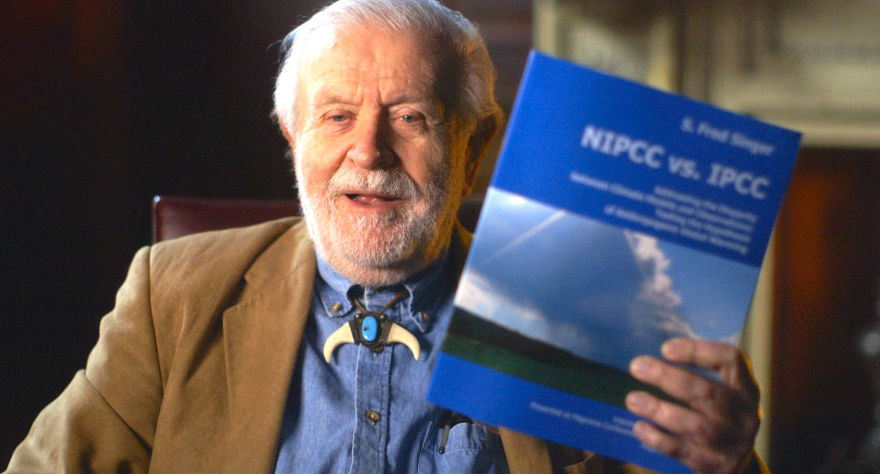
A polished education in the art of public deception aimed squarely at the liberal set.

A polished education in the art of public deception aimed squarely at the liberal set.
One of my favorite documentaries of 2013 was Molly Bernstein’s Deceptive Practice: The Mysteries and Mentors of Ricky Jay. The film chronicles the titular, iconic magician’s life, which he spent in the company of some the world’s most gifted deceivers and illusionists, who used distraction, sleight of hand, and clever verbiage to trick the eyes of onlookers standing mere feet away. Robert Kenner‘s Merchants of Doubt, the follow-up to his penetrating 2008 doc Food, Inc., opens with Jamy Ian Swiss, a sleight-of-hand artist of Ricky Jay’s ilk, performing tricks for a small, exclusive audience at Los Angeles’ famous Magic Castle night club. Listening to Swiss explain the art of deception as he twirls cards in his hands, you’re inclined to believe the film will be an exposé on the world of magic. But just as magicians do, Kenner has fooled you.
Merchants of Doubt is about deceivers, certainly, but not those in league with Swiss and Jay, conjurers rubber balls and aces of clubs out of thin air. Swiss and his cards are merely a framing device for the real meat of the movie: Kenner investigates men who fabricate, obfuscate, and distract in a different arena, spin artists so slick they can go on television and convince a nation that cigarettes don’t cause house fires — couches do. What’s of interest here are the slithery stratagems employed by these men, who work for the country’s biggest oil and cigarette companies as well as propagate the nation’s pervading global warming skepticism, despite their claims flying in the face of scientific fact.
While Food, Inc. was meant as a wake-up call to get people to pay closer attention to the food they eat on a daily basis, Merchants is less call-to-action and more a study on the nature of manufacturing doubt. Corporations hire charismatic people like Marc Morano, who poses as a scientist on news channels like FOX News and CNN and spreads misinformation about climate change, to debate less verbally adept scientists, swaying public opinion in the company’s favor. Winning the debate is, of course, never in the cards, since the scientific community is almost always in full agreement on these issues. The goal of men like Morano (whose candor about his work is frankly shocking) is to muddle the conversation and delay public action so that the corporations can make as much money as possible under our noses. It’s despicable, and yet the film presents these con artists in an almost admiring light; this is the art of misdirection at its finest.
Still, the absurdity of what these companies and their hired misinformers are able to get away with is set firmly in the film’s crosshairs. It’s an intelligent lampooning of corporate malfeasance in the public eye, logically laying out the playbook that’s helped companies like Big Tobacco and Exxon protect their bottom lines since the ’50s. In the film’s most fascinating example of public dishonesty and fraud, we see footage of surgeon David Heimbach in court telling a heartbreaking story about a woman who set a candle down in her baby’s crib, resulting in the child being fatally burned. We then hear from some Chicago Tribune reporters who did some investigating and found that Heimbach’s story was completely fabricated, and that he’d told it many times before, under oath. What’s more disturbing, Heimbach was representing an organization called Citizens for Fire Safety, which turns out is a front for manufacturers of flame-retardants.
One of the more fascinating aspects of the film are the layers of illusion at play. You’ve got the poser-pundits, fooling millions on television, and then you’ve got Swiss and his magic, deceiving people on a smaller scale. But there’s another, meta layer: filmmakers are some of the most popular illusionists in the world, skillfully manipulating our emotions, provoking us to laugh and cry as we stare at light being projected on canvas. Kenner, like Morano, Heimbach and Swiss, is pulling our strings all the while, right under our noses.
If the film has a weakness it’s that its scoffing, lambasting treatment of its subjects will only be entertaining to those unconvinced by the spin-masters’ tactics. There’s a huge population of people who are skeptical of climate change, but Merchants of Doubt isn’t for them; it’s for liberals who are already convinced of climate change and the dangers of cigarettes. People who already view men like Morano and Heimbach as trustworthy sources of information will likely turn the film off within the first ten minutes. But for the rest of us, the film is a great conversation-starter and a polished, entertaining education in the art of deception.